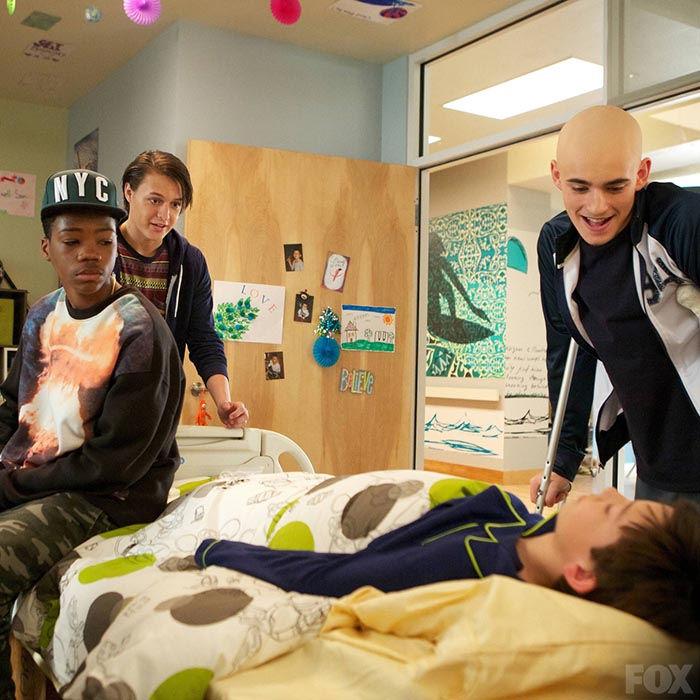Red Band Society leaves me seeing red
I’m sick of TV shows romanticizing illness and watering down tragic situations.
October 20, 2014
The Internet keeps telling me that cancer is a terrible, terrible disease. I mean, take a look at The Fault in Our Stars! The people of the Internet totally get how I feel – they saw If I Stay, so they know how bad being in a hospital is. They know what it feels like to lose control of some of the most basic facets of life in exchange for a weakened immune system and a bald head. Right?
I am a huge fan of John Green; I’ve been watching his videos and reading his books for years, and I adore the TFIOS movie. Last year, I was diagnosed with Hodgkin’s lymphoma. The first thought that naturally popped into my head upon learning of the diagnosis was not, “OMG I’m just like Hazel Grace now!” But it sure seems like that would be the visceral reaction for some people these days.
The proliferation of stories about illness has taken over movies and TV like – dare I say – an epidemic. People want to see what this experience is like without living it themselves, to feel and connect with this “other” group of people. TFIOS is supposed to be the exception, not the rule. Media these days has overused and romanticized sickness almost to the point of exploitation (I’m looking at you, Chasing Life). But one of the worst is Red Band Society.
This show, which premiered Sept. 17 on Fox, revolves around a group of teenagers living in a hospital and the adults taking care of them. It’s narrated by Charlie, a comatose 12-year-old who somehow overhears every single plot point as it is described in elaborate detail right outside his door. Or at least that’s the most logical explanation as to how he can narrate this story. He knows everything going on at any point in time in any part of the hospital, even though he’s in a coma.
The non-comatose characters are just as problematic. It would be useless to go into detail about each patient in particular; what you really need to know is that they all seem to hide their insecurities about their illnesses in layers of sarcasm and emotional distance. I personally found only one of the characters genuinely likable. Jordi is resourceful, brave and, honestly, pretty attractive. He is also an unwilling roommate to Leo, both of whom have the Most Attractive Cancer of 2014: osteosarcoma. You know, like Augustus Waters.. Coincidence? I think not.
But at least Gus never smoked his cigarettes.
That’s right. There are many cases for the most unrealistic aspect of this show, including, “Every space in this entire hospital is twice as big as it is in any real hospital ever,” or, “Even if he did donate an exorbitant amount of money to the hospital, a hypochondriac should not be allowed to live in any of said oversized hospital rooms for free.” But the most compelling one is, “These kids drink and do drugs. In a hospital. While taking very potent medications.”
I mean, I couldn’t have very much sourdough bread or soy sauce, among other things, while taking chemotherapy without possibly causing serious heart problems, and I was only in the hospital two nights a month. These kids seem to live here year-round, meaning they’re constantly getting treatment of some sort. Yet, they consider it okay to cause themselves even more harm.
Almost immediately after overhearing that her name is at the bottom of the heart transplant list because of the incredible amount of drugs found in her system, one of the characters finds a way to con beer out of a hospital volunteer for a rooftop party later that evening. Somehow, there is no problem with the patients’ medication if they constantly hurt themselves with illegal substances, which I find hard to believe. Chemo is ridiculously tough as is without any other harmful materials entering your body and messing stuff up.
Red Band Society has been generally well-received by the public. On average, 3.62 million people watch each episode, and 82% of audiences on Rotten Tomatoes enjoy it. Many of its negative reviews, however, mention how “it’s hard to be critical of a show imbued with such good intentions” or that “it pains me to say negative things about a show that wears its heart so obviously on its sleeve.” Even the reviewers are wary to criticize, in case their assessment comes off as an insult to cancer patients.
This show tries to make the unrelatable concepts of illness, particularly at a young age, relatable. I have to admit, it’s an admirable goal. But it romanticizes and exploits its subject matter to an unreasonable extent. The pilot alone includes quotes like, “Living in a hospital is sort of like going to boarding school. You have a lot of rules, but a lot of freedom. And if you get in trouble, I mean, how bad can it be? You’re already in a hospital” and “When you’re in a hospital trying to get better, the most important part of you that needs to survive… is you.”
It’s hard for people to realize this without experience in subjects such as these. But as a recent cancer patient, I can honestly say that Red Band Society exploits and romanticizes its subject matter. Its blatant disregard of realism is detrimental to the complex understanding of sickness as a whole.








Katie Schwertley • Oct 21, 2014 at 12:30 pm
Finally someone said it! I watched about 5 minutes of the show and wanted to throw up. Everything the kids say is poetic, and they glamorize sickness so much. I’ve never been in the hospital per se, but I have somewhat experienced what it is like through Tricia- and it’s NOTHING like that. (not saying I’ve been through anything you, Tricia, or anyone has) But I do know that you don’t get your own room with all these cool decorations (like it’s your house), you can be moved daily, none of the kids have even have IV poles, and like you said above, you don’t get to drink and smoke in a hospital. Like I said, I’m not saying that I’ve been in the hospital and know what it’s like, but I have been exposed to some of it, and glamorizing sickness and living in a hospital all the time is just wrong.